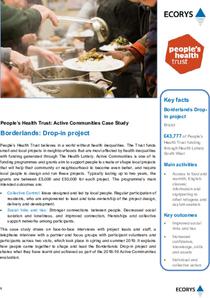Main activities
Access to food and warmth, English classes, information and signposting to other refugees and asylum seekers
Where
Bristol
Key outcomes
- Improved social links and ties
- Increased confidence, knowledge, skills and assets
- Individual and collective action
When
2017 - 2019
The drop-in centre offered refugees and asylum seekers access to food, warmth, English classes, information and signposting to other services. It brought together participants from over 50 countries, many of whom shared similar life experiences. Participants could make social contact, access services, and improve their English.
Task-based volunteering was one of the several ways for people to get involved in shaping and leading the project. Members could access food at the café, and this sharing of food was a central component of the project. Volunteers helped prepare, serve and clean up after meals: working together in a team helped to build self-esteem, confidence, and create social connections and friendships.
Project members serving food as part of the project
Over time, members and volunteers felt more connected with their community, forming new friendships and extending their social networks. This began from the very first moment a new participant attended the drop-in, because the welcome desk was run by members with lived experience of being a refugee or asylum seeker, to help put new arrivals at ease.
“We sit in the cafe and chat to other people and we are happy, we chat we are like a family.” (Participant)
By providing a friendly and welcoming relaxed atmosphere, the Drop-in café’ provided an important forum for bonding. This was developed by the structured activities offered. For example, English classes promoted a sense of belonging and camaraderie, emphasising the development of communication skills and using relevant examples to help orientate new arrivals to British society. Members who were refugees and asylum seekers particularly valued this, as they often had very limited knowledge of Britain or the local community.
“A friend in the same accommodation told me about it. He brought me here when I first came [to] Bristol. He recommended Borderlands for socialising, meet new people, if you have a problem, they could help you to find a solicitor, or GP, help you to get energy access. Borderlands can introduce you to the GP or other healthcare.” (Participant)
Some members, once they had gained their right to remain status, utilised their skills and experience to progress into education and employment, or used their leadership skills in the wider community. The progression of utilised confidence and skills in this way both promoted increased individual outcomes over time, and project sustainability – leading to longer term outcomes. Members developed a sense of belonging through Borderlands, which could be maintained as they progressed on their personal journey in the wider community.
“Member volunteering has become a strategic priority, quite informally... and tracking progress on some level. That is indicative of a new way of working, we are not just delivering a service... We are trying to be smarter and have goals and a strategy, that’s something that we want... That feels like a success.” (Project lead)
The project was funded by People’s Health Trust with money raised through The Health Lottery in the South West.
This case study was carried out by Ecorys UK, who are conducting an independent evaluation of People's Health Trust's Active Communities programme. This case study formed part of the last year of the evaluation process.

